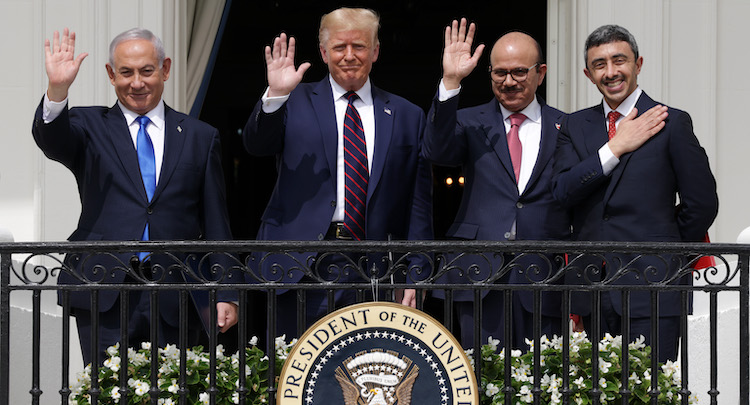When the Abraham Accords were signed in 2020, they hailed a significant moment in Middle East history by paving the way for a public embrace of Israel by Arab states. But as the agreements come up on their five year anniversary at the end of the summer, the transformation they represent is only starting to become clear.
On CNBC on Wednesday, Steve Witkoff, the Trump administration’s globetrotting envoy, teased new additions to the accords: “we think we’re going to have some pretty big announcements on countries that are now coming into the Abraham Peace Accords. And we’re hoping for normalization across an array of countries that maybe people would have never contemplated, would come in. So we’re excited. We’re excited for that prospect that will also be a stabilizer in the Middle East.”
The most interesting candidate for normalization is Syria. Israel’s ongoing talks with Syria aren’t mainly about normalization, of course. But normalization is the logical endpoint of what has already started, even if it isn’t explicitly depicted that way.
When Bashar al-Assad fled the country and Ahmed al-Sharaa’s militia took Damascus, there was a period of predictable chaos. The Israeli military crossed the border and established a buffer zone to ensure that terrorist ministates would not fill the vacuum in southern Syria the way they had in South Lebanon. Israel also was conscious of the presence of chemical and other weapons depots and conducted airstrikes to neutralize threats.
Despite complaints throughout the media and pundit world that Israel was making it impossible for Sharaa to stabilize the state, the opposite was the case: The IDF was essentially pacifying some of the state for him, and Israel’s staunch defense of the Druze triggered negotiations with the new government that prevented a possible nightmare of ethnic conflict in Druze strongholds.
Indeed, Sharaa seemed mostly unbothered by Israel’s intervention. He didn’t want another fight on his hands, and he was benefiting from Israel’s actions far more than he would have ever been comfortable admitting.
The ongoing talks between Israel and Syria, then, are absolutely necessary for both countries. This is what puts the “normal” in “normalization”: It is the rational way for nation-states to pursue their interests. The Abraham Accords created a framework that benefits states like Syria, because they too are in need of a certain degree of integration.
In the old Middle East, a path to normalization with Israel wouldn’t have been necessary for Syria to achieve this integration, because the system into which it was integrating had enough structure: a regional leader (Egypt), mutual defense agreements with other Arab states, and a stronger Russian patron.
Lebanon is in a similar position. It has rarely known extended periods of stability. It has a chance to gain that stability now, however, thanks entirely to Israel’s weakening of Hezbollah and Iran.
The point is that even if Syria and Lebanon don’t join the Abraham Accords, the fact that the Abraham Accords were in place when Iran’s imperial tide receded means that there is already a new regional structure to replace the old one. If Syria and Lebanon want to make it in the new Middle East, they cannot rely on Iran and Russia. They must navigate the increased influence of the U.S. and Israel.
Membership in the Abraham Accords could, if trends continue, become a sought-after status marker because it is arguably becoming a sort of security umbrella.
That is easier to see if you’re not instinctively anti-Israel, by the way. Those who view Israel as a colonialist enterprise have a great deal of trouble understanding the Arab regimes in the region as well. The reality is that Iran was the colonialist power, the occupier, the expansionist hegemon with an appetite for power and blood and conquest.
Mahmoud Abbas knows that, too. The Palestinian Authority president is no democrat and no peacemaker, but what is his goal for the Palestinian territories? To rid the PA-controlled areas of the West Bank of their Iranian militias and to convince Hamas to surrender in Gaza. Abbas wouldn’t dare say such things if he thought Hamas’s defeat in Gaza would simply mean Israel would annex the coastal enclave. He knows that Israel isn’t the destabilizing threat in Gaza. He also knows that Israel isn’t the destabilizing threat in the West Bank: His security forces and Israeli security forces coordinate attempts to flush out Iranian militias to increase Abbas’s area of control.
This is yet another boon of President Trump’s decision to bomb Iranian nuclear sites. He has followed through on his promises in the Middle East, giving him credibility and a certain amount of leverage in the region. He has won the favor of Riyadh and, for the moment, knocked Tehran out of the ring. So there is no way around the U.S. (and therefore Israel) if you’re looking for alliances in the Middle East. And wouldn’t you know it, Abbas has now reached out to Trump so he doesn’t get left behind.
The Abraham Accords may have begun as a limited diplomatic framework. But in the years that have followed, they have continually defied those limits. They might one day soon become simply the status quo.


















